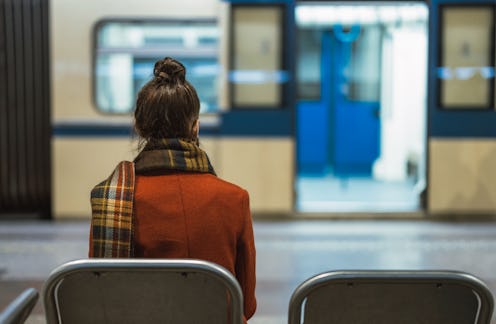Life
This Surprising Stat May Impact Your Commute Soon

When I tell people that I cannot legally drive, and have never had a driver's license, I am usually met with shock and confusion. However, this soon may be the norm as a new study reveals that over the past five years fewer people are getting driver's licenses. I always felt part of a select group of non-drivers who by choice or sheer laziness never got around to taking driver’s ed or hustling over to the DMV. I am now the last hold out among my friends and relatives (which means I get chauffeured around a lot). Growing up in New York City with its excellent public transportation system (and horrible parking), a car was never necessary. But for teens living outside of a major metropolitan area, a driver's license could be the equivalent of freedom and escape from the 'burbs. Once you received that laminated piece of paper you were independent, no longer a burden on others, and could go wherever you pleased — as long as you weren't grounded. So why has the license seemingly lost its luster?
Researchers Michael Sivak and Brandon Schoettle at the the University of Michigan Transportation Institute found that from 2011 to 2014 the percentage of people with driver's licenses had significantly decreased overall. The study found this to be true across all age groups — especially teens. In fact, for people ages 16 to 44, this decline has been happening at a steady rate since 1983. In 1983, 46.2 percent of 16-year-olds had their license, but fast forward 31 years, and only 24.5 percent can legally drive. If you are thinking that they will surely get their license before college— that's not necessarily true. In 1983, 87.3 percent of 19-year-olds had their license, which dropped to 69 percent in 2014. For statistics lovers that equals, a 47 percent decrease among 16-year-olds and a 21 percent decrease for 19-year-olds. It seems the days of teens getting a car on their Sweet 16 are far behind us.
Throughout one's 20s, the decrease was smaller but still noteworthy. While older and elderly adults were more likely to have their license in 2014 than in 1983, even those age groups saw a small decline from 2011 to 2014. Those 44 and older began their driving decline in 2008 and people over 69 started the decrease around 2011.
Researchers are still unsure as to why this is occurring, though there are many hypotheses. In an earlier study, researchers surveyed non-drivers ages 18 to 39 to find out the most common reason for their lack of license. The main reasons given were not environmentally-oriented or to do with their lifestyle not requiring a car. Thirty-seven percent said they were "Too busy or not enough time to get a driver’s license," followed by 32 percent that thought"owning and maintaining a vehicle is too expensive," and finally 31 percent said that they were "able to get transportation from others." Owning a starter car has been an age-old way to learn responsibility, but now most consider it too expensive an undertaking.
The Atlantic suggests that perhaps driving in America has already peaked, and that with modern developments people will spend less and less time traveling in the future, "The ease of Amazon, the rise of teleworking, and the endless entertainment provided by the Internet may be leading people to stay home more." But those surveyed haven't completely given up on the possibility of driving. Sixty-nine percent of those polled said they still intended to get their license in the next five years.
I too still intend to get my license, though I do not have a pressing need for it currently. I see it as a pivotal part of growing up, and intend to take my rightful place in this nation of drivers. Eventually.
Images: Getty Images